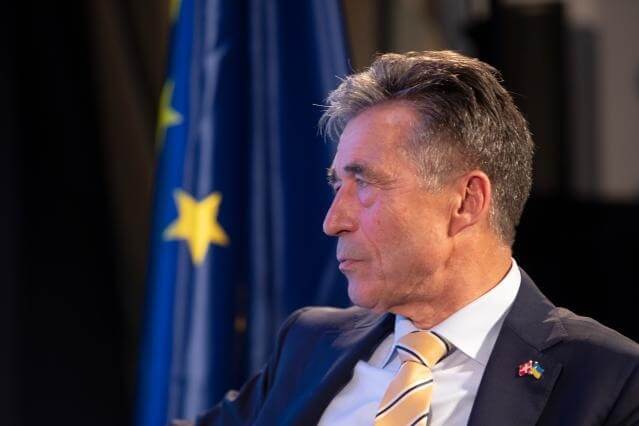It has been 56 years since Neil Armstrong, at the height of the Cold War, set foot on the moon and captured the world’s imagination.
But space is no longer simply about exploration and innovation. It has become a front line for security, particularly for Europe.
Just days after Russia’s invasion of Ukraine, a Russian cyberattack took down a satellite network providing critical connectivity to Europe.
And now, both Russia and China are developing weapons to jam, overwhelm, and destroy Europe’s satellites.
Yet for too long, European ambitions in space have fallen short of what our security demands.
We are watching from the sidelines as American companies like Elon Musk’s SpaceX crowd us out of low Earth orbit.
The European Union’s per capita space spending is around five times less than that of the United States, and half that of Japan.
The Chinese government’s space budget is roughly three times higher than the European Space Agency’s, and our private-sector space investment is approximately one-fourth that of the US.
Urgent priorities
Faced with these glaring disparities, I see three urgent priorities for Europe. The first is to break the taboo on defense investment in space.
Like drones and AI, space technology has both military and civilian applications. It is also capital-intensive.
In the US, defense-related projects and equipment account for roughly 60% of space-related spending.
If Europe is going to develop its space capabilities, it must tap into its defense and security budgets as they rise in response to Russia’s invasion of Ukraine.
We need a European-level policy to drive growth in our space industry
The European Commission’s inclusion of a Space Shield in its European Defence – Readiness 2030 plan is a step in the right direction, but we must go further.
To that end, we need a European-level policy to drive growth in our space industry.
While SpaceX is now essential to the US defense and intelligence communities, Europe has no comparable champion.
What we do have, however, are promising space startups that need new funding and the right policy environment to encourage growth in the sector.
We can act independently in space
The second priority is to ensure that we can act independently in space, just as we must on land, in the air, and at sea.
Europe is too often reliant on foreign actors, primarily the US, for key capabilities like launchers, Earth observation, and ISR (intelligence, surveillance, and reconnaissance systems).
We must secure these capabilities for ourselves, either through European companies or those willing to invest in Europe’s value chains. Failure to do so would be a profound mistake.
Real-time intelligence and global surveillance capacity have become essential to modern defense planning
We have seen the US cut off satellite imagery to Ukraine, and we cannot allow that to happen elsewhere in Europe.
Real-time intelligence and global surveillance capacity have become essential to modern defense planning.
As one example of what can be done, I have proposed a joint Nordic satellite constellation for surveillance and secure communications.
By pooling defense investment and private-sector expertise across the Nordic countries, we could spread costs, strengthen our collective defense, and boost our space industries.
Protecting low Earth orbit
The third priority is to defend our markets and lead the way on protecting low Earth orbit and the sovereignty it provides.
In 2018, there were roughly 2,000 active satellites in space. But that number has since risen above 10,000, and there could be 100,000 or more active satellites by the end of the decade.
 We should never again be reliant on those who do not share our values – be they erratic Russian autocrats or erratic American billionaires - Anders Fogh Rasmussen
We should never again be reliant on those who do not share our values – be they erratic Russian autocrats or erratic American billionaires - Anders Fogh Rasmussen
Such rapid overcrowding – driven primarily by mega constellations of satellites from a handful of US companies – is an overlooked threat to national security, sovereignty, and our ability to secure safe access to space.
When these low-orbit satellites break apart, their debris circulates at speeds eight times faster than a bullet, increasing the risks of Kessler Syndrome: spiraling debris-creating collisions that eventually render low Earth orbit inaccessible.
Equally concerning is the growing number of satellites laying claim to finite radio spectrum, the invisible signal highway connecting satellites to Earth.
If left unaddressed, the shortage of spectrum and the signal interference from mega constellations will threaten Europe’s ability to maintain the critical security, observation, and communications services that space access enables.
With progress toward new multilateral agreements at the United Nations becoming nearly impossible in the face of the new great power rivalry, and with the Cold War-era rules governing the use of space now woefully outdated, Europe must act.
We must protect our markets from those who use space irresponsibly, and – building on the EU Space Act – we must work with like-minded countries to champion new national rules that will ensure space remains accessible to future generations.
Russia’s invasion of Ukraine reminded Europe that we cannot take our security for granted.
We should never again be reliant on those who do not share our values – be they erratic Russian autocrats or erratic American billionaires.
We must act decisively to address the critical challenges facing our access to space.
John F. Kennedy once said of America’s moonshot that we do these things “not because they are easy, but because they are hard.” Europe must now do them because they are urgent and necessary.
Anders Fogh Rasmussen, a former NATO secretary-general (2009-14) and former prime minister of Denmark, is Founder of the Alliance of Democracies Foundation.